Submitted:
05 October 2023
Posted:
09 October 2023
You are already at the latest version
Abstract
Keywords:
1. Introduction
2. Fueling the Future: Advancements in Hydrogen Storage Technologies
3. Hydrogen-Powered Hybrid Cars: A Green Revolution on Wheels
4. Hydrogen Refueling Stations: A Green and Radiant Future for Sustainable Transportation
5. Exploring the Battery Landscape in Hydrogen Hybrid Electric Vehicles
6. Revolutionizing Fuel Cell Vehicles with Artificial Intelligence (AI)
7. Revolutionizing the Automotive Industry: How Quantum Computing is Paving the Way for Sustainable Hydrogen Fuel Cell Vehicles
8. Shaping the Future of Transportation: A Detailed Analysis of Fuel Cell-Powered Vehicle Models and Industry Innovators
9. An Overview of Fuel Cell Vehicle Landscape: Global and Regional Trends, Vehicle Types, and Adoption Levels
10. Challenges, Opportunities, and Future Directions
11. Conclusions
References
- De Lorenzo, G.; Ruffo, R.M.; Fragiacomo, P. Preliminary Design of the Fuel Cells Based Energy Systems for a Cruise Ship. World Electr. Veh. J. 2023, 14, 263. [Google Scholar] [CrossRef]
- Ramasubramanian, Brindha, et Al. “Novel Low-Carbon Energy Solutions for Powering Emerging Wearables, Smart Textiles, and Medical Devices.” Energy & Environmental Science 15.12 (2022): 4928-4981.
- Kashani, S.A.; Soleimani, A.; Khosravi, A.; Mirsalim, M. State-of-the-Art Research on Wireless Charging of Electric Vehicles Using Solar Energy. Energies 2022, 16, 282. [Google Scholar] [CrossRef]
- Mehdizadeh Khorrami, B., Soleimani, A., Pinnarelli, A. et al. Forecasting Heating and Cooling Loads in Residential Buildings Using Machine Learning: A Comparative Study of Techniques and Influential Indicators. Asian J Civ Eng (2023). Https://Doi.Org/10.1.
- Mohsin, Muhammad, et Al. “Integrated Effect of Energy Consumption, Economic Development, and Population Growth on CO 2 Based Environmental Degradation: A Case of Transport Sector.” Environmental Science and Pollution Research 26 (2019): 32824-32835.
- Simon Araya, Samuel, et Al. “A Review of the Methanol Economy: The Fuel Cell Route.” Energies 13.3 (2020): 596..
- Neumann, T. Efficient Use of Low-Emission Power Supply for Means of Transport. Energies 2023, 16, 3536. [Google Scholar] [CrossRef]
- Genovese, M.; Schlüter, A.; Scionti, E.; Piraino, F.; Corigliano, O.; Fragiacomo, P. Power-to-hydrogen and hydrogen-to-X energy systems for the industry of the future in Europe. Int. J. Hydrogen Energy 2023, 48, 16545–16568. [Google Scholar] [CrossRef]
- Alaswad, A.; Baroutaji, A.; Achour, H.; Carton, J.; Al Makky, A.; Olabi, A.G. Developments in fuel cell technologies in the transport sector. Int. J. Hydrogen Energy 2016, 41, 16499–16508. [Google Scholar] [CrossRef]
- Ahmadi, P.; Khoshnevisan, A. Dynamic simulation and lifecycle assessment of hydrogen fuel cell electric vehicles considering various hydrogen production methods. Int. J. Hydrogen Energy 2022, 47, 26758–26769. [Google Scholar] [CrossRef]
- De Wolf, D.; Smeers, Y. Comparison of Battery Electric Vehicles and Fuel Cell Vehicles. World Electr. Veh. J. 2023, 14, 262. [Google Scholar] [CrossRef]
- Pihlatie, M.; Ranta, M.; Rahkola, P.; Åman, R. Zero-Emission Truck Powertrains for Regional and Long-Haul Missions. World Electr. Veh. J. 2023, 14, 253. [Google Scholar] [CrossRef]
- Wang, W.; Li, J.; Li, Y. Consumer willingness to purchase hydrogen fuel cell vehicles:A meta-analysis of the literature. Int. J. Hydrogen Energy 2023. [Google Scholar] [CrossRef]
- Abdelkareem, M.A.; Elsaid, K.; Wilberforce, T.; Kamil, M.; Sayed, E.T.; Olabi, A. Environmental aspects of fuel cells: A review. Sci. Total. Environ. 2020, 752, 141803. [Google Scholar] [CrossRef]
- Hacking, N.; Pearson, P.; Eames, M. Mapping innovation and diffusion of hydrogen fuel cell technologies: Evidence from the UK's hydrogen fuel cell technological innovation system, 1954–2012. Int. J. Hydrogen Energy 2019, 44, 29805–29848. [Google Scholar] [CrossRef]
- Zhao, T.; Liu, Z. Investment Timing Analysis of Hydrogen-Refueling Stations and the Case of China: Independent or Co-Operative Investment? Energies 2023, 16, 5032. [Google Scholar] [CrossRef]
- Mohideen, M.M.; Subramanian, B.; Sun, J.; Ge, J.; Guo, H.; Radhamani, A.V.; Ramakrishna, S.; Liu, Y. Techno-economic analysis of different shades of renewable and non-renewable energy-based hydrogen for fuel cell electric vehicles. Renew. Sustain. Energy Rev. 2023, 174, 113153. [Google Scholar] [CrossRef]
- Daud, W.; Rosli, R.; Majlan, E.; Hamid, S.; Mohamed, R.; Husaini, T. PEM fuel cell system control: A review. Renew. Energy 2017, 113, 620–638. [Google Scholar] [CrossRef]
- Corigliano, O.; Pagnotta, L.; Fragiacomo, P. On the Technology of Solid Oxide Fuel Cell (SOFC) Energy Systems for Stationary Power Generation: A Review. Sustainability 2022, 14, 15276. [Google Scholar] [CrossRef]
- Arico, A. S., S. Srinivasan, and V1 Antonucci. “DMFCs: From Fundamental Aspects to Technology Development.” Fuel Cells 1.2 (2001): 133-161.
- Ferriday, Thomas Benjamin, and Peter Hugh Middleton. “Alkaline Fuel Cell Technology-A Review.” International Journal of Hydrogen Energy 46.35 (2021): 18489-18510.
- Sammes, N.; Bove, R.; Stahl, K. Phosphoric acid fuel cells: Fundamentals and applications. Curr. Opin. Solid State Mater. Sci. 2004, 8, 372–378. [Google Scholar] [CrossRef]
- Dicks, Andrew L. “Molten Carbonate Fuel Cells.” Current Opinion in Solid State and Materials Science 8.5 (2004): 379-383.
- Xian, Y.; Xia, M.; Su, S.; Guo, M.; Chen, F. Research on the Market Diffusion of Fuel Cell Vehicles in China Based on the Generalized Bass Model. IEEE Trans. Ind. Appl. 2021, 58, 2950–2960. [Google Scholar] [CrossRef]
- Aminudin, M.; Kamarudin, S.; Lim, B.; Majilan, E.; Masdar, M.; Shaari, N. An overview: Current progress on hydrogen fuel cell vehicles. Int. J. Hydrogen Energy 2023, 48, 4371–4388. [Google Scholar] [CrossRef]
- Caponi, R.; Ferrario, A.M.; Del Zotto, L.; Bocci, E. Hydrogen refueling stations and fuel cell buses four year operational analysis under real-world conditions. Int. J. Hydrogen Energy 2023, 48, 20957–20970. [Google Scholar] [CrossRef]
- Molfetta, Roberto Di. Strategies for Regional Deployment of Hydrogen Infrastructure. MS Thesis. Universitat Politècnica de Catalunya, 2022..
- Mohideen, M.M.; Subramanian, B.; Sun, J.; Ge, J.; Guo, H.; Radhamani, A.V.; Ramakrishna, S.; Liu, Y. Techno-economic analysis of different shades of renewable and non-renewable energy-based hydrogen for fuel cell electric vehicles. Renew. Sustain. Energy Rev. 2023, 174, 113153. [Google Scholar] [CrossRef]
- Caponi, R.; Ferrario, A.M.; Bocci, E.; Bødker, S.; del Zotto, L. Single-tank storage versus multi-tank cascade system in hydrogen refueling stations for fuel cell buses. Int. J. Hydrogen Energy 2022, 47, 27633–27645. [Google Scholar] [CrossRef]
- Ouyang, L.; Chen, K.; Jiang, J.; Yang, X.-S.; Zhu, M. Hydrogen storage in light-metal based systems: A review. J. Alloy. Compd. 2020, 829, 154597. [Google Scholar] [CrossRef]
- Desai, F.J.; Uddin, N.; Rahman, M.M.; Asmatulu, R. A critical review on improving hydrogen storage properties of metal hydride via nanostructuring and integrating carbonaceous materials. Int. J. Hydrogen Energy 2023, 48, 29256–29294. [Google Scholar] [CrossRef]
- Jiang, Y.; Yu, Y.; Wang, Z.; Zhang, S.; Cao, J. CFD simulation of heat transfer and phase change characteristics of the cryogenic liquid hydrogen tank under microgravity conditions. Int. J. Hydrogen Energy 2023, 48, 7026–7037. [Google Scholar] [CrossRef]
- Perez, F.; Al Ghafri, S.Z.; Gallagher, L.; Siahvashi, A.; Ryu, Y.; Kim, S.; Kim, S.G.; Johns, M.L.; May, E.F. Measurements of boil-off gas and stratification in cryogenic liquid nitrogen with implications for the storage and transport of liquefied natural gas. Energy 2021, 222, 119853. [Google Scholar] [CrossRef]
- Zivar, D.; Kumar, S.; Foroozesh, J. Underground hydrogen storage: A comprehensive review. Int. J. Hydrogen Energy 2020, 46, 23436–23462. [Google Scholar] [CrossRef]
- Rivard, E.; Trudeau, M.; Zaghib, K. Hydrogen Storage for Mobility: A Review. Materials 2019, 12, 1973. [Google Scholar] [CrossRef]
- Yu, X.; Tang, Z.; Sun, D.; Ouyang, L.; Zhu, M. Recent advances and remaining challenges of nanostructured materials for hydrogen storage applications. Prog. Mater. Sci. 2017, 88, 1–48. [Google Scholar] [CrossRef]
- Davids, M. W., et Al. Metal Hydride Hydrogen Storage Tank for Light Fuel Cell Vehicle. International Journal of Hydrogen Energy 44.55 (2019): 29263-29272.
- Babu, AR Vijay, et Al. “A Review on the Progress of Intermetallic Solid-State Hydrogen Storage Material for Fuel Cell Vehicles.” European Chemical Bulletin 11.1 (2022): 17-29.
- Özdoğan, E.; Hüner, B.; Süzen, Y.O.; Eşiyok, T.; Uzgören, I.N.; Kıstı, M.; Uysal, S.; Selçuklu, S.B.; Demir, N.; Kaya, M.F. Effects of tank heating on hydrogen release from metal hydride system in VoltaFCEV Fuel Cell Electric Vehicle. Int. J. Hydrogen Energy 2023, 48, 6811–6823. [Google Scholar] [CrossRef]
- Ma, Y.; Hu, F.; Hu, Y. Energy efficiency improvement of intelligent fuel cell/battery hybrid vehicles through an integrated management strategy. Energy 2023, 263, 125794. [Google Scholar] [CrossRef]
- Xu, J.; Zhang, C.; Wan, Z.; Chen, X.; Chan, S.H.; Tu, Z. Progress and perspectives of integrated thermal management systems in PEM fuel cell vehicles: A review. Renew. Sustain. Energy Rev. 2021, 155, 111908. [Google Scholar] [CrossRef]
- Fan, L.; Tu, Z.; Chan, S.H. Recent development of hydrogen and fuel cell technologies: A review. Energy Rep. 2021, 7, 8421–8446. [Google Scholar] [CrossRef]
- Lipman, T.E.; Elke, M.; Lidicker, J. Hydrogen fuel cell electric vehicle performance and user-response assessment: Results of an extended driver study. Int. J. Hydrogen Energy 2018, 43, 12442–12454. [Google Scholar] [CrossRef]
- Karaoğlan, M. Umut, N. Sefa Kuralay, and C. Ozgur Colpan. “The Effect of Gear Ratıos on the Exhaust Emıssıons and Fuel Consumptıon of a Parallel Hybrid Vehicle Powertrain.” Journal of Cleaner Production 210 (2019): 1033-1041.
- Eckert, Jony Javorski, et Al. “Energy Management and Gear Shifting Control for a Hybridized Vehicle to Minimize Gas Emissions, Energy Consumption and Battery Aging.” Energy Conversion and Management 240 (2021): 114222.
- Veerendra, A.S.; Mohamed, M.R.; Leung, P.K.; Shah, A.A. Hybrid power management for fuel cell/supercapacitor series hybrid electric vehicle. Int. J. Green Energy 2020, 18, 128–143. [Google Scholar] [CrossRef]
- Zhuang, W.; (Eben), S.L.; Zhang, X.; Kum, D.; Song, Z.; Yin, G.; Ju, F. A survey of powertrain configuration studies on hybrid electric vehicles. Appl. Energy 2020, 262, 114553. [Google Scholar] [CrossRef]
- Genovese, M.; Fragiacomo, P. Hydrogen refueling station: Overview of the technological status and research enhancement. J. Energy Storage 2023, 61, 106758. [Google Scholar] [CrossRef]
- Isaac, N.; Saha, A.K. A Review of the Optimization Strategies and Methods Used to Locate Hydrogen Fuel Refueling Stations. Energies 2023, 16, 2171. [Google Scholar] [CrossRef]
- Chen, Y.; Lan, L.; Hao, Z.; Fu, P. Cradle-grave energy consumption, greenhouse gas and acidification emissions in current and future fuel cell vehicles: Study based on five hydrogen production methods in China. Energy Rep. 2022, 8, 7931–7944. [Google Scholar] [CrossRef]
- Greene, D.L.; Ogden, J.M.; Lin, Z. Challenges in the designing, planning and deployment of hydrogen refueling infrastructure for fuel cell electric vehicles. eTransportation 2020, 6, 100086. [Google Scholar] [CrossRef]
- Shamsi, H.; Tran, M.-K.; Akbarpour, S.; Maroufmashat, A.; Fowler, M. Macro-Level optimization of hydrogen infrastructure and supply chain for zero-emission vehicles on a canadian corridor. J. Clean. Prod. 2020, 289, 125163. [Google Scholar] [CrossRef]
- Hansen, O.R. Hydrogen infrastructure—Efficient risk assessment and design optimization approach to ensure safe and practical solutions. Process. Saf. Environ. Prot. 2020, 143, 164–176. [Google Scholar] [CrossRef]
- Han, J.; Woo, J.; Kim, Y.; Yu, S. Fuel cell/battery power supply system operational strategy to secure the durability of commercial hydrogen vehicles. Energy Convers. Manag. 2023, 288, 117163. [Google Scholar] [CrossRef]
- Fu, Zuhang, et Al. “Fuel Cell and Hydrogen in Maritime Application: A Review on Aspects of Technology, Cost and Regulations.” Sustainable Energy Technologies and Assessments 57 (2023): 103181.
- Deng, K.; Liu, Y.; Hai, D.; Peng, H.; Löwenstein, L.; Pischinger, S.; Hameyer, K. Deep reinforcement learning based energy management strategy of fuel cell hybrid railway vehicles considering fuel cell aging. Energy Convers. Manag. 2021, 251, 115030. [Google Scholar] [CrossRef]
- Raeesi, M.; Changizian, S.; Ahmadi, P.; Khoshnevisan, A. Performance analysis of a degraded PEM fuel cell stack for hydrogen passenger vehicles based on machine learning algorithms in real driving conditions. Energy Convers. Manag. 2021, 248, 114793. [Google Scholar] [CrossRef]
- Li, W.; Ye, J.; Cui, Y.; Kim, N.; Cha, S.W.; Zheng, C. A Speedy Reinforcement Learning-Based Energy Management Strategy for Fuel Cell Hybrid Vehicles Considering Fuel Cell System Lifetime. Int. J. Precis. Eng. Manuf. Technol. 2021, 9, 859–872. [Google Scholar] [CrossRef]
- Sun, H.; Fu, Z.; Tao, F.; Zhu, L.; Si, P. Data-driven reinforcement-learning-based hierarchical energy management strategy for fuel cell/battery/ultracapacitor hybrid electric vehicles. J. Power Sources 2020, 455, 227964. [Google Scholar] [CrossRef]
- Zuo, J.; Lv, H.; Zhou, D.; Xue, Q.; Jin, L.; Zhou, W.; Yang, D.; Zhang, C. Deep learning based prognostic framework towards proton exchange membrane fuel cell for automotive application. Appl. Energy 2020, 281, 115937. [Google Scholar] [CrossRef]
- This Study Developed a Hydrogen Leak Localization System Using Machine Learning Algorithms and Measured Helium Concentration Data. The System Accurately Predicted Leak Locations with 78.4% Accuracy Using an Artificial Neural Network (ANN) and Identified L.
- Lalwani, Jitesh, and Babita Jajodia. “Quantum Computing for Mars Exploration: Opportunities and Challenges.
- Suga, Yoshinori, et Al. “A Feasibility Study for Quantum Computing Methodologies in Automotive Advanced Material Investigation.” Transactions of Society of Automotive Engineers of Japan 54.1 (2023).
- Bentley, Christopher DB, et Al. “Quantum Computing for Transport Optimization.” ArXiv Preprint ArXiv:2206.07313 (2022).
- Harwood, S.; Gambella, C.; Trenev, D.; Simonetto, A.; Neira, D.B.; Greenberg, D. Formulating and Solving Routing Problems on Quantum Computers. IEEE Trans. Quantum Eng. 2021, 2, 1–17. [Google Scholar] [CrossRef]
- Shu, W.; Li, Y. Joint offloading strategy based on quantum particle swarm optimization for MEC-enabled vehicular networks. Digit. Commun. Networks 2023, 9, 56–66. [Google Scholar] [CrossRef]
- Yin, L.; Liu, D. Quantum parallel model predictive control for grid-connected solid oxide fuel cells. Appl. Soft Comput. 2023, 137, 110157. [Google Scholar] [CrossRef]
- Wang, Y.; Yuan, H.; Martinez, A.; Hong, P.; Xu, H.; Bockmiller, F.R. Polymer electrolyte membrane fuel cell and hydrogen station networks for automobiles: Status, technology, and perspectives. Adv. Appl. Energy 2021, 2, 100011. [Google Scholar] [CrossRef]
- Ajanovic, A.; Glatt, A.; Haas, R. Prospects and impediments for hydrogen fuel cell buses. Energy 2021, 235, 121340. [Google Scholar] [CrossRef]
- Fernández, R. .; Caraballo, S.C.; Cilleruelo, F.B.; Lozano, J.A. Fuel optimization strategy for hydrogen fuel cell range extender vehicles applying genetic algorithms. Renew. Sustain. Energy Rev. 2018, 81, 655–668. [Google Scholar] [CrossRef]
- Samsun, R.C.; Rex, M.; Antoni, L.; Stolten, D. Deployment of Fuel Cell Vehicles and Hydrogen Refueling Station Infrastructure: A Global Overview and Perspectives. Energies 2022, 15, 4975. [Google Scholar] [CrossRef]
- Ko, S.; Shin, J. Projection of fuel cell electric vehicle demand reflecting the feedback effects between market conditions and market share affected by spatial factors. Energy Policy 2023, 173, 113385. [Google Scholar] [CrossRef]
- Teng, T.; Zhang, X.; Dong, H.; Xue, Q. A comprehensive review of energy management optimization strategies for fuel cell passenger vehicle. Int. J. Hydrogen Energy 2020, 45, 20293–20303. [Google Scholar] [CrossRef]
- Foorginezhad, S.; Mohseni-Dargah, M.; Falahati, Z.; Abbassi, R.; Razmjou, A.; Asadnia, M. Sensing advancement towards safety assessment of hydrogen fuel cell vehicles. J. Power Sources 2021, 489. [Google Scholar] [CrossRef]
- Rasul, M. G., et Al. “The Future of Hydrogen: Challenges on Production, Storage and Applications.” Energy Conversion and Management 272 (2022): 116326.
- Trencher, G. Strategies to accelerate the production and diffusion of fuel cell electric vehicles: Experiences from California. Energy Rep. 2020, 6, 2503–2519. [Google Scholar] [CrossRef]
- Sinha, A.A.; Saini, G.; Sanjay; Shukla, A.K.; Ansari, M.Z.; Dwivedi, G.; Choudhary, T. A novel comparison of energy-exergy, and sustainability analysis for biomass-fueled solid oxide fuel cell integrated gas turbine hybrid configuration. Energy Convers. Manag. 2023, 283, 116923. [CrossRef]
- Zhang, W.; Fang, X.; Sun, C. The alternative path for fossil oil: Electric vehicles or hydrogen fuel cell vehicles? J. Environ. Manag. 2023, 341, 118019. [Google Scholar] [CrossRef]
- Usman, Muhammad R. “Hydrogen Storage Methods: Review and Current Status.” Renewable and Sustainable Energy Reviews 167 (2022): 112743.
- Hannan, M.; Abu, S.M.; Al-Shetwi, A.Q.; Mansor, M.; Ansari, M.; Muttaqi, K.M.; Dong, Z. Hydrogen energy storage integrated battery and supercapacitor based hybrid power system: A statistical analysis towards future research directions. Int. J. Hydrogen Energy 2022, 47, 39523–39548. [Google Scholar] [CrossRef]
- Wang, S.; Pei, Z.; Wang, C.; Wu, J. Shaping the Future of the Application of Quantum Computing in Intelligent Transportation System. 2021, 2, 259–276. [CrossRef]
- Zhang, et Al., Integrated Performance Optimization of a Biomass-Based Hybrid Hydrogen/Thermal Energy Storage System for Building and Hydrogen Vehicles", Renewable Energy, Elsevier, 2022.
- Wen, et Al., “A First Study of the Potential of Integrating an Ejector in Hydrogen Fuelling Stations for Fuelling High Pressure Hydrogen Vehicles”, Applied Energy, Elsevier, 2022.
- Pique, et Al., “Comparative Study of Regulations, Codes and Standards and Practices on Hydrogen Fuelling Stations”, International Journal of Hydrogen Energy, Elsevier, 2017.
- Fernandez, et Al., “Fuel Optimization Strategy for Hydrogen Fuel Cell Range Extender Vehicles Applying Genetic Algorithms”, Renewable and Sustainable Energy Reviews", Elsevier, 2018.
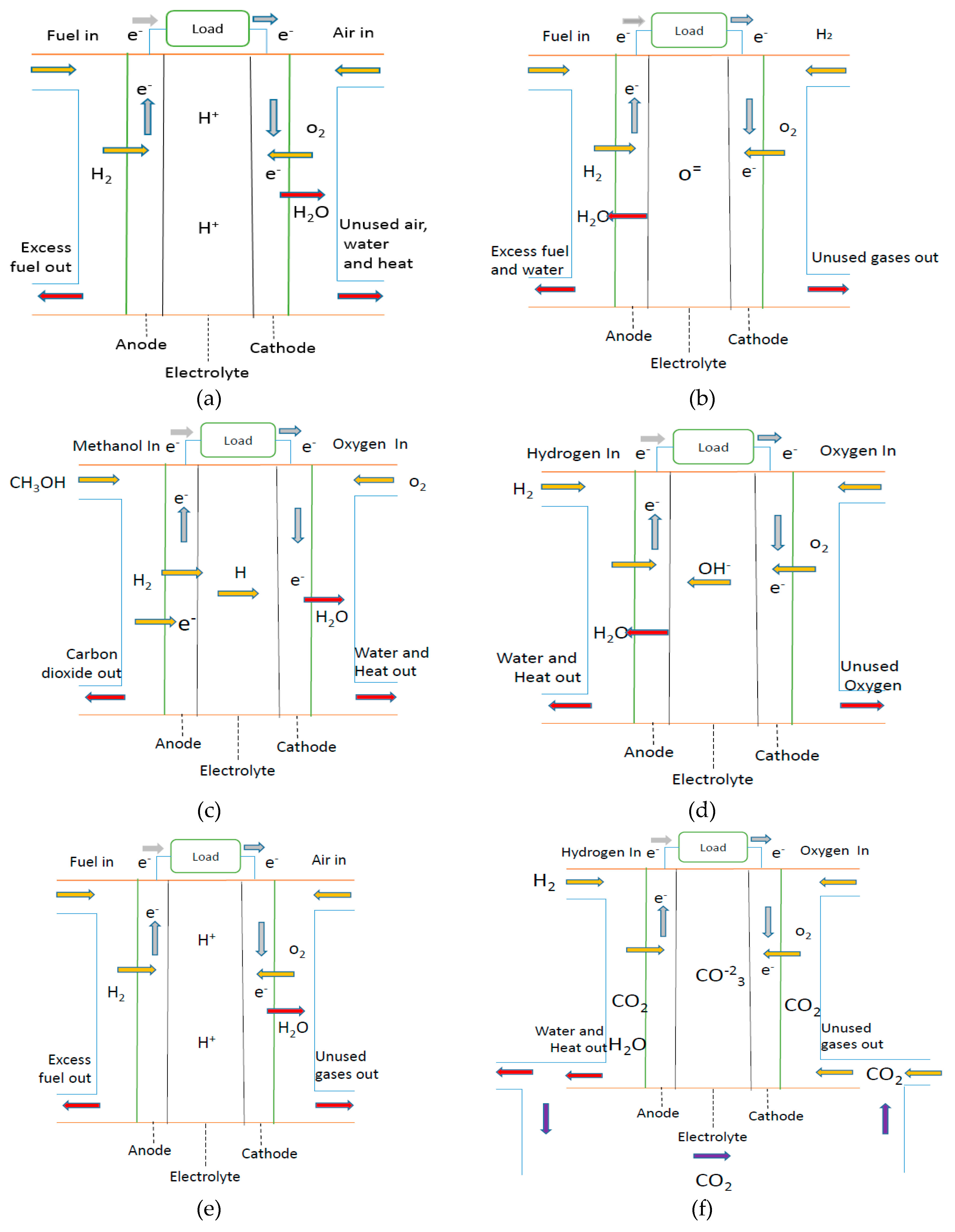
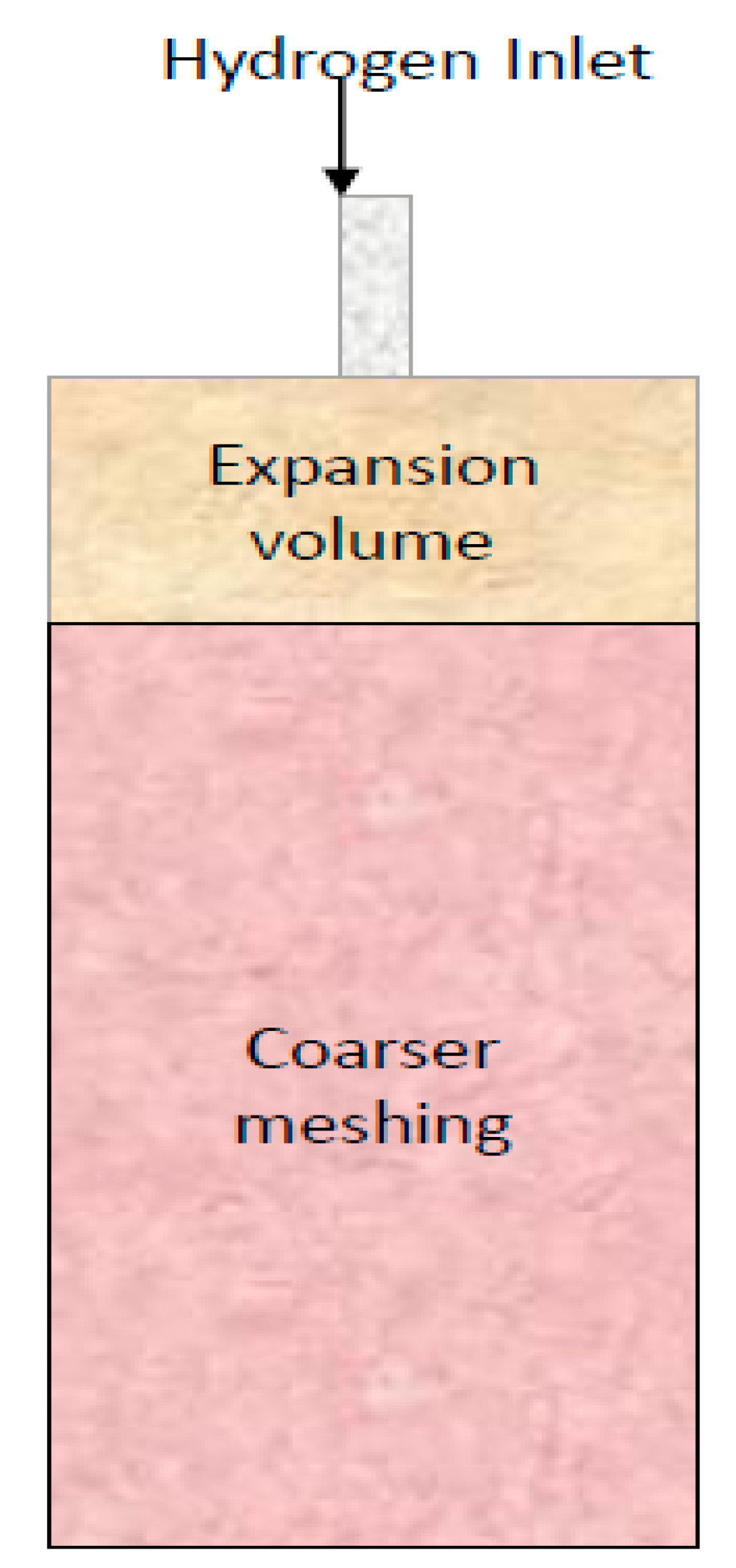
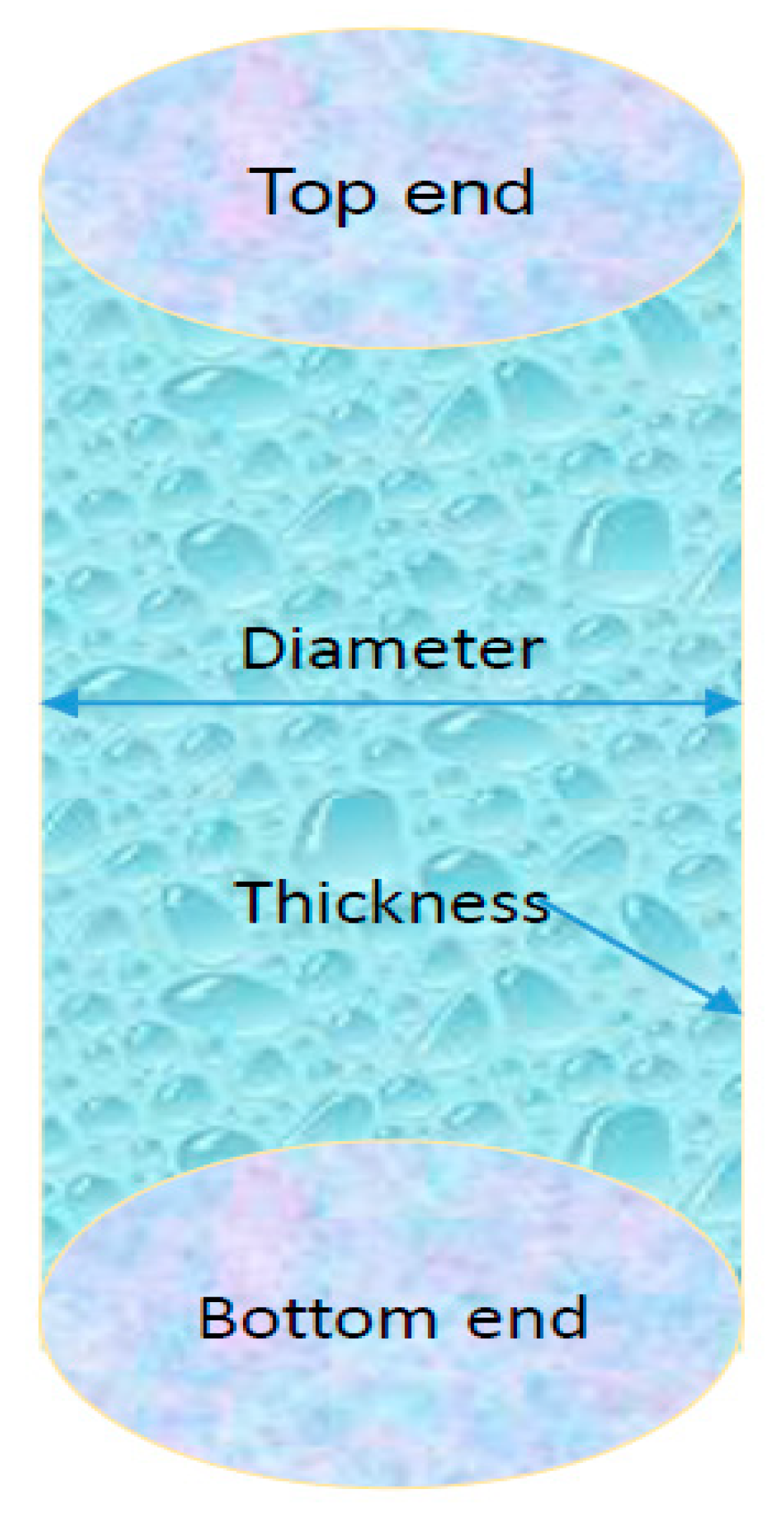
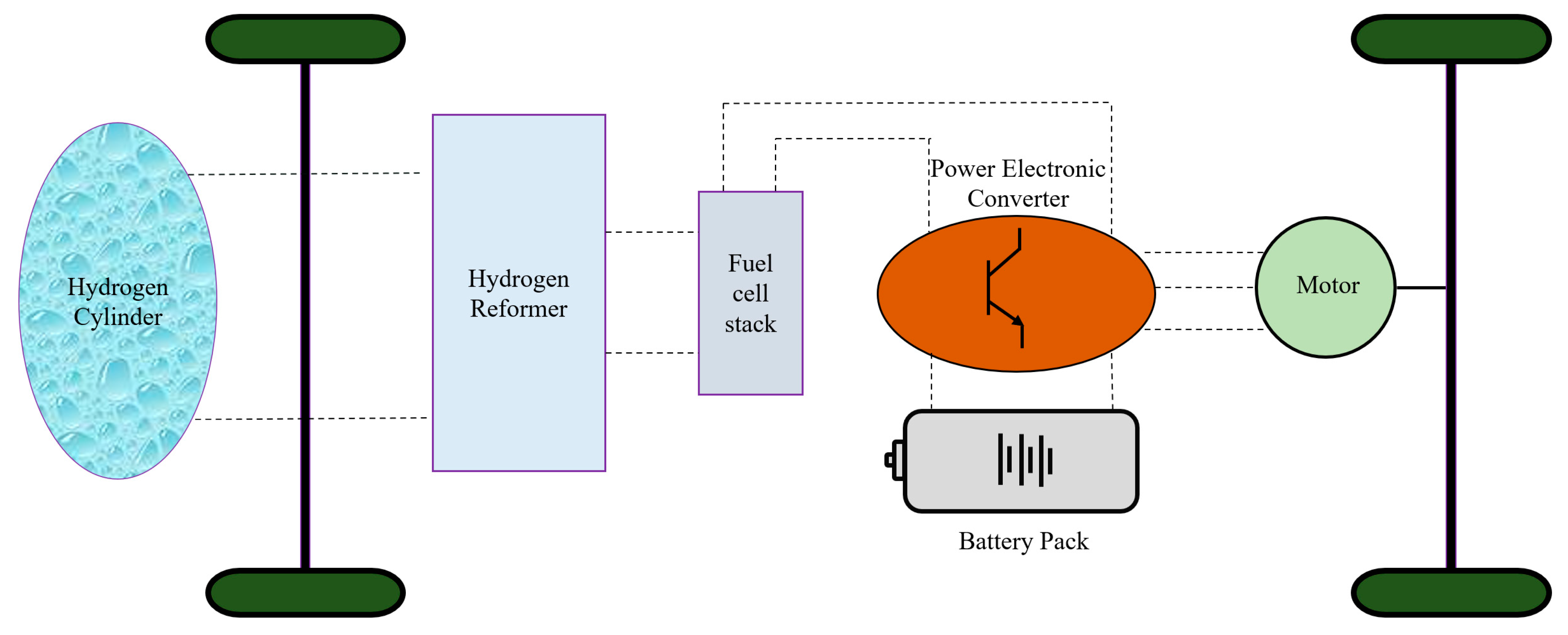
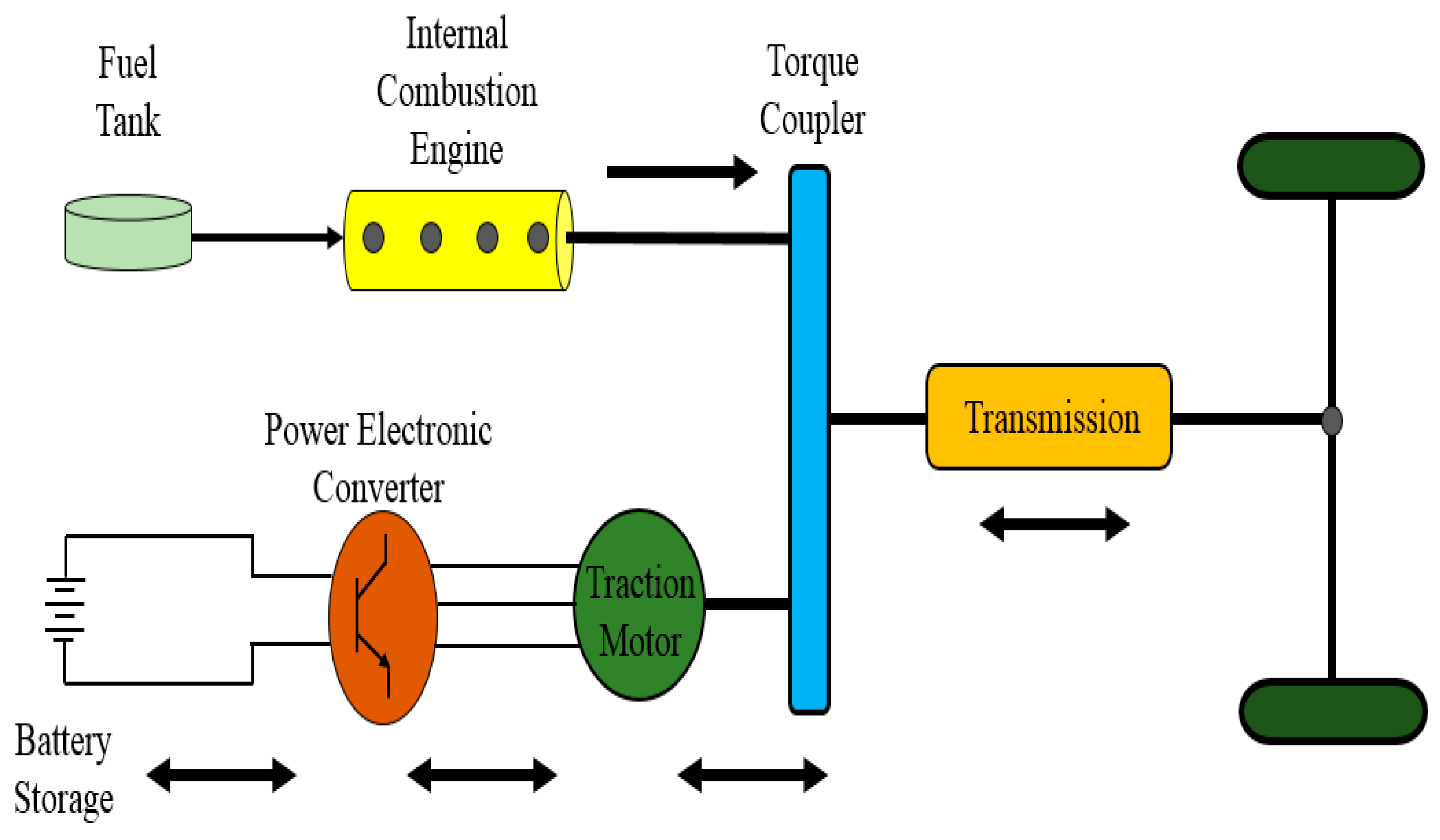
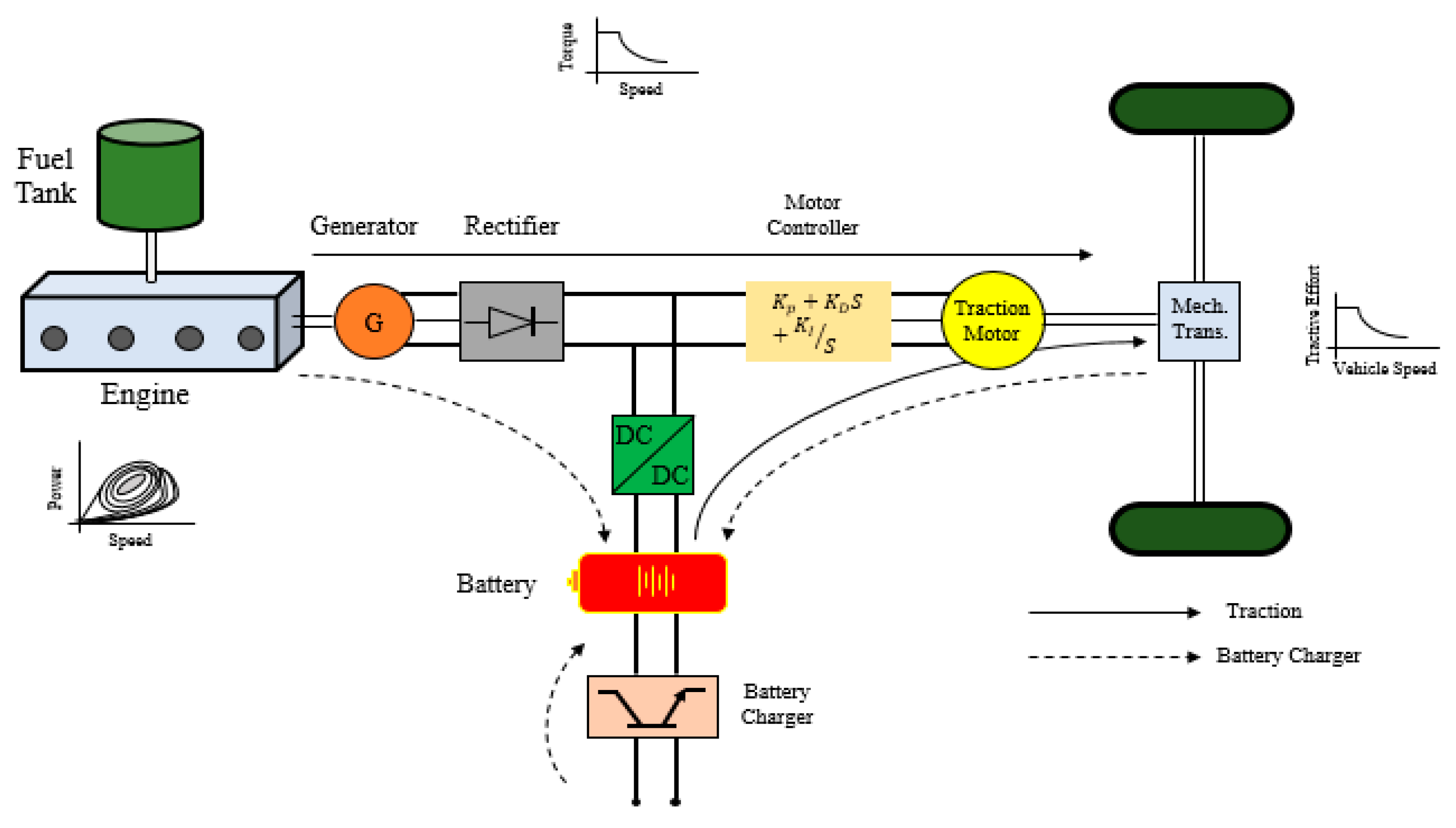
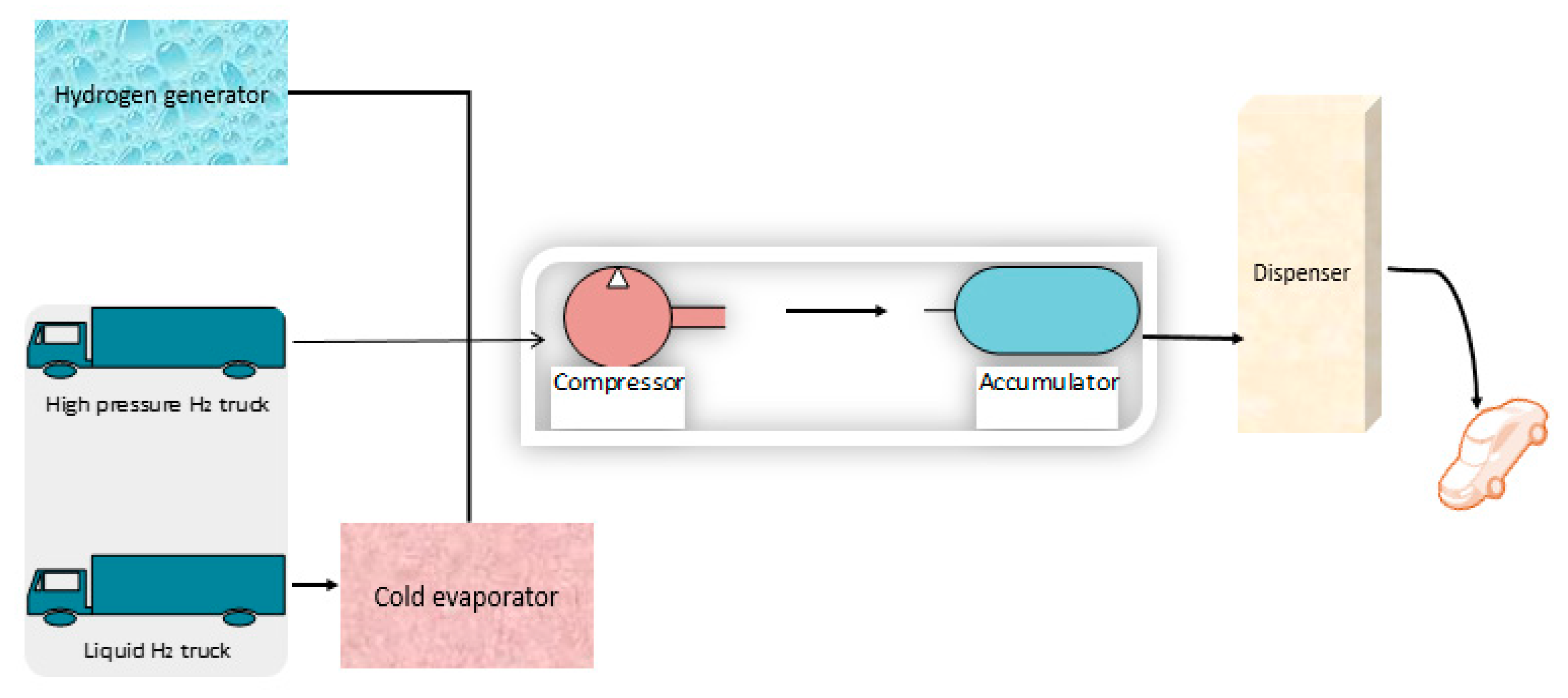
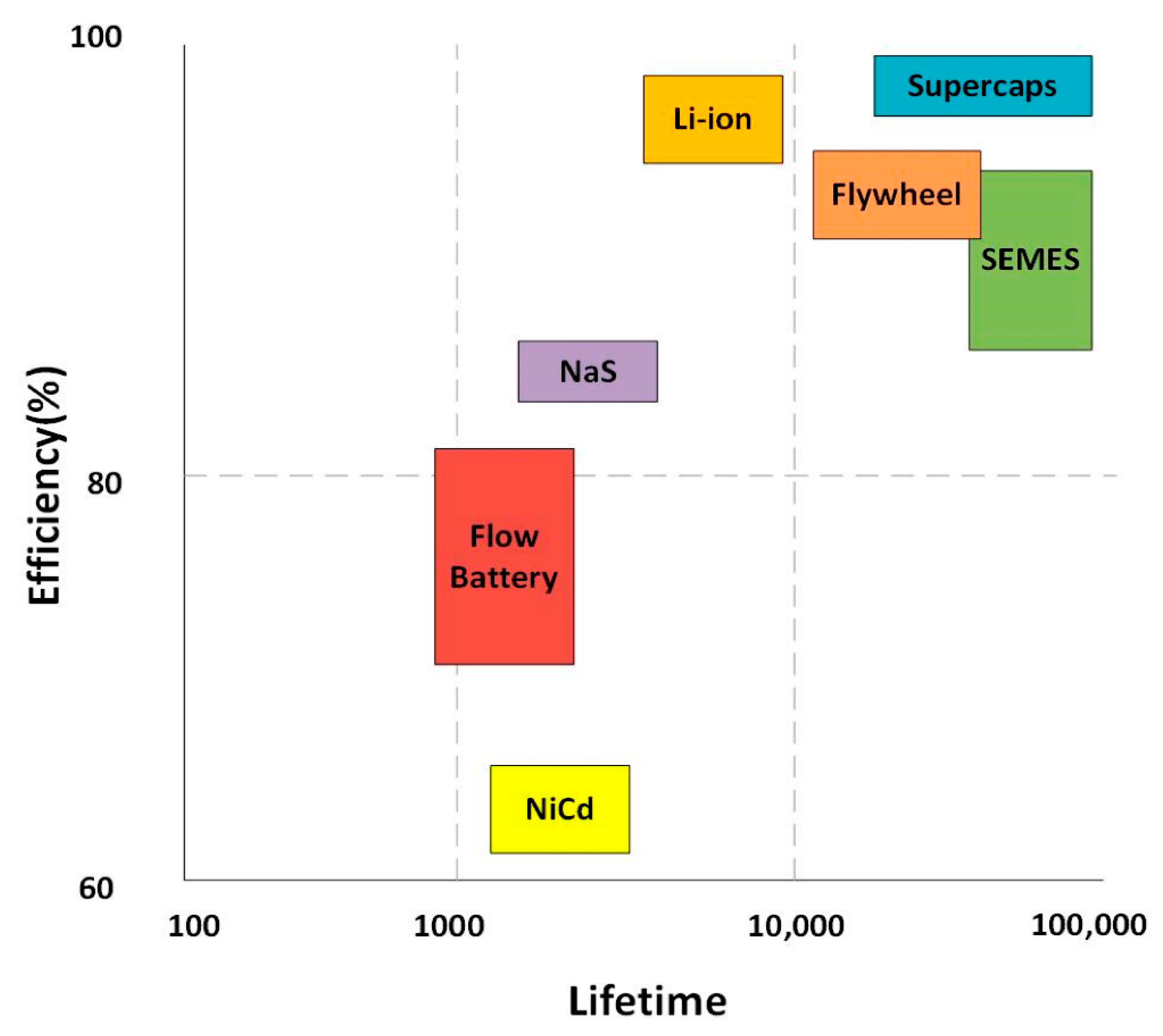
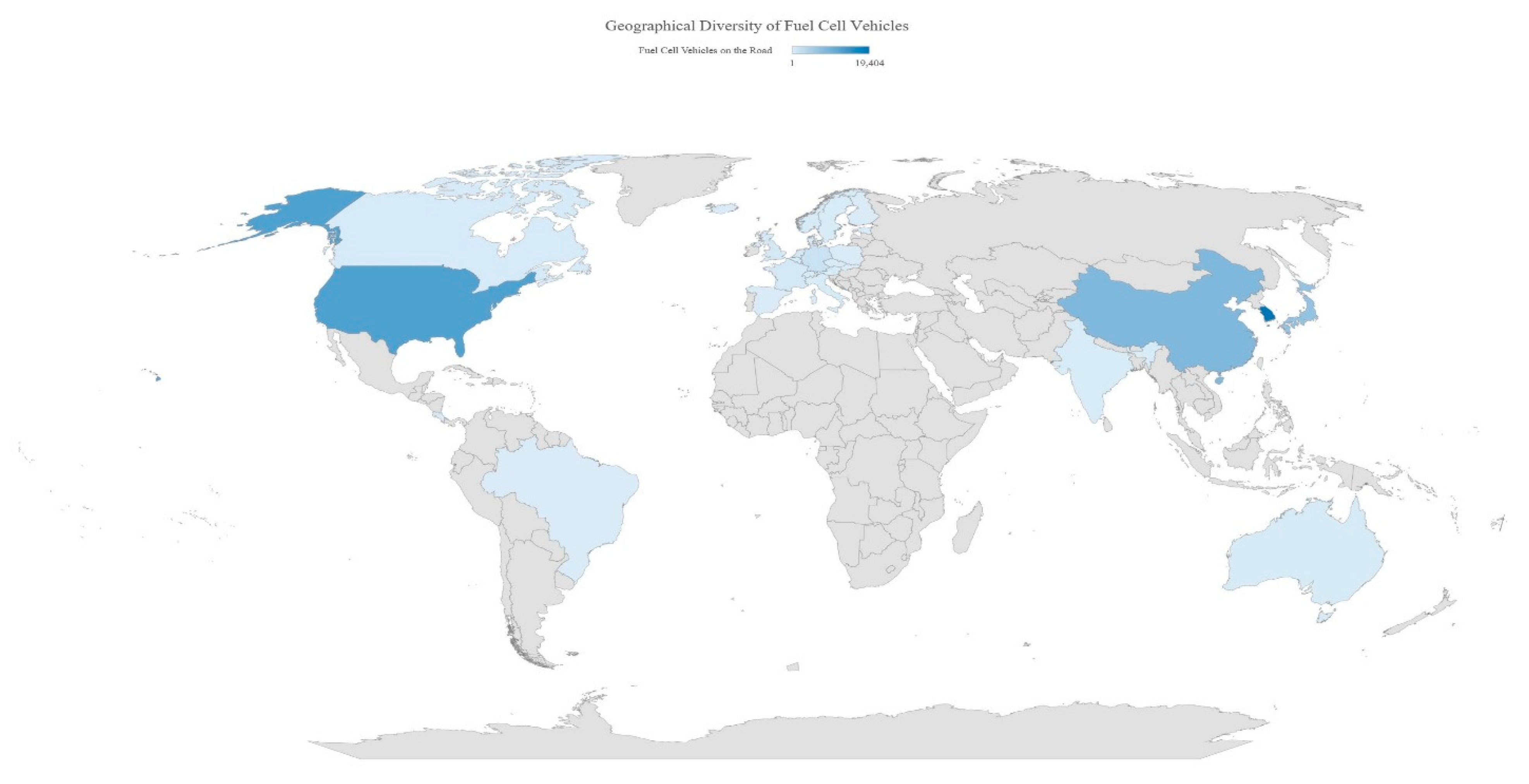
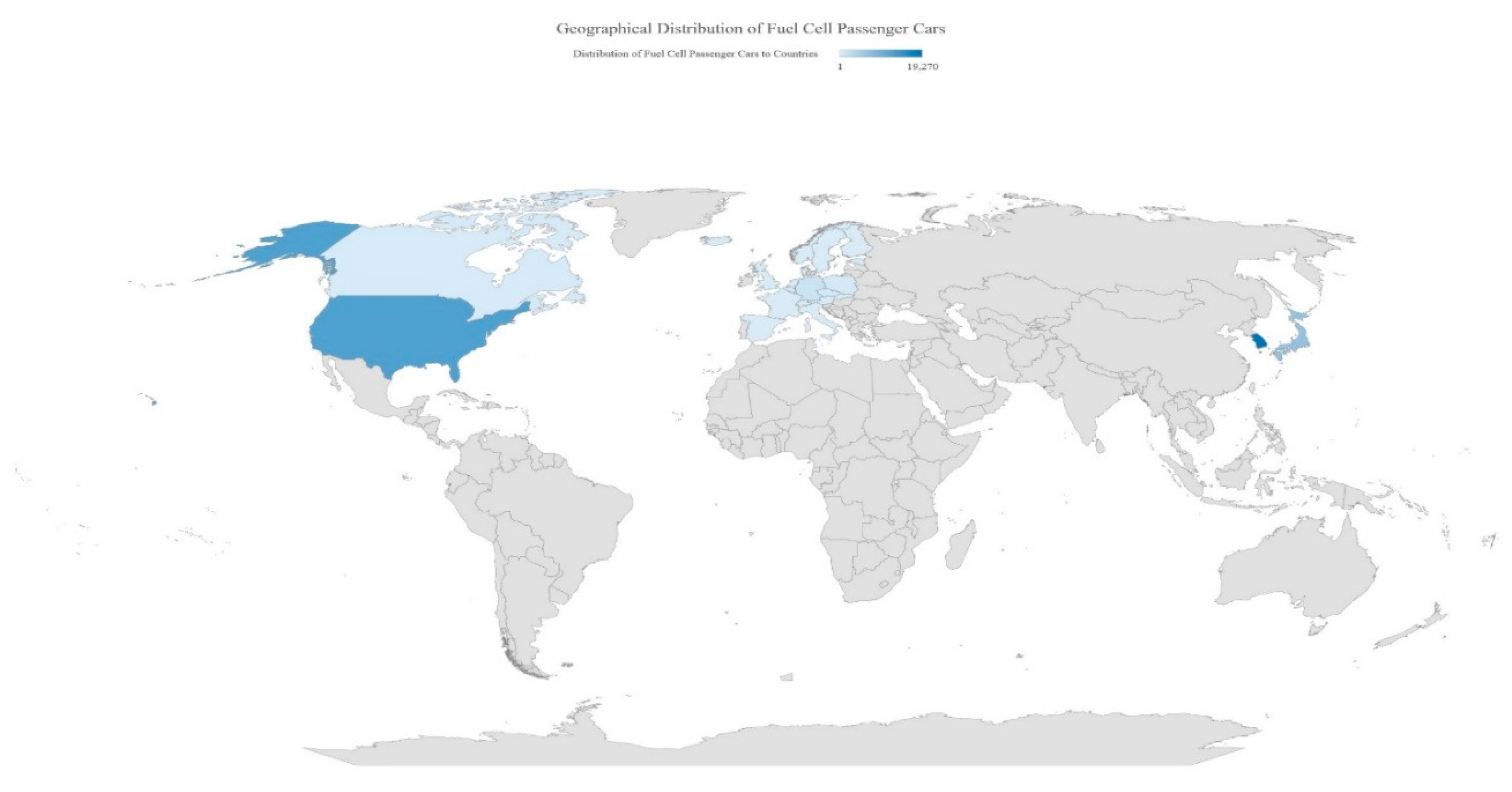
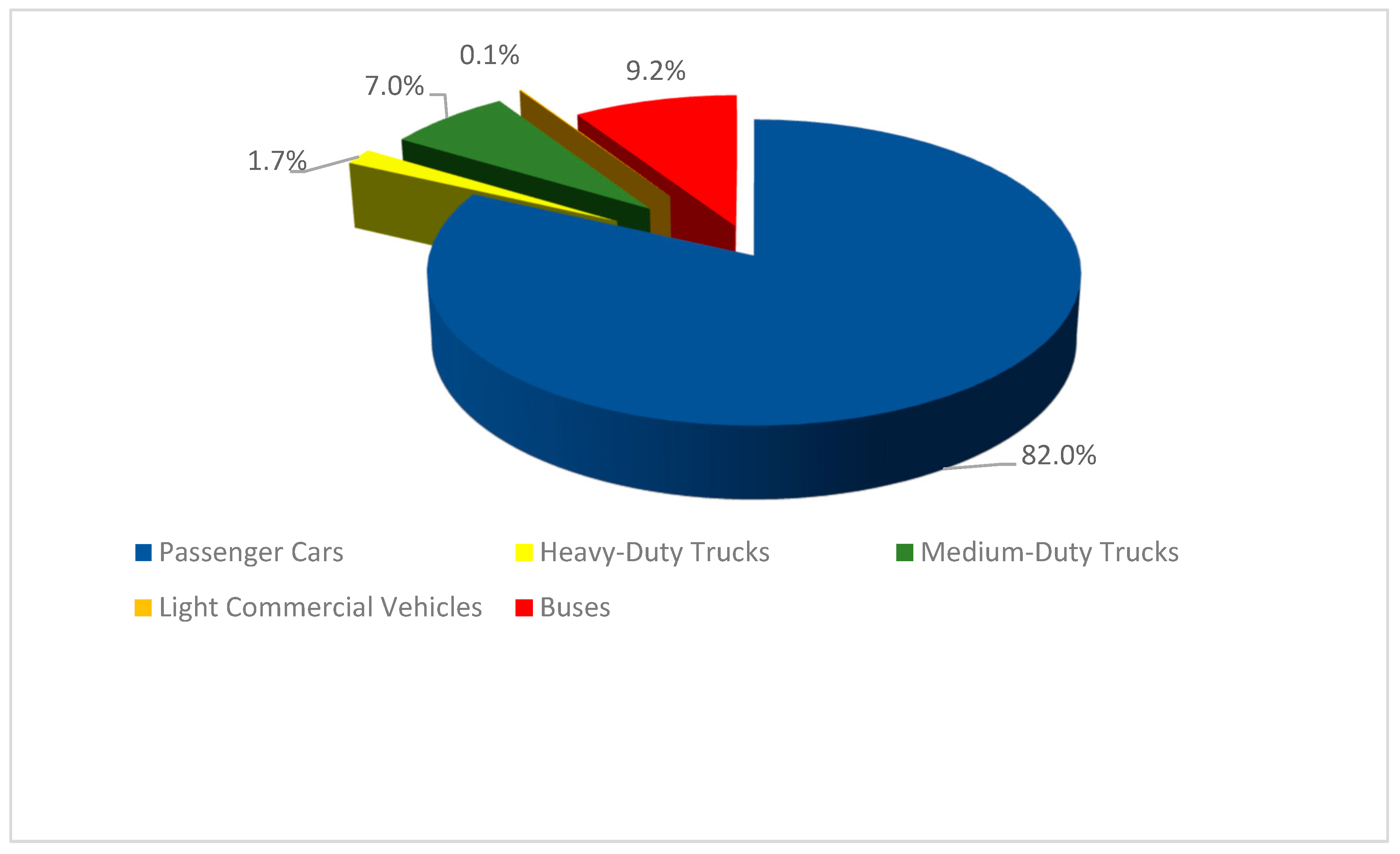
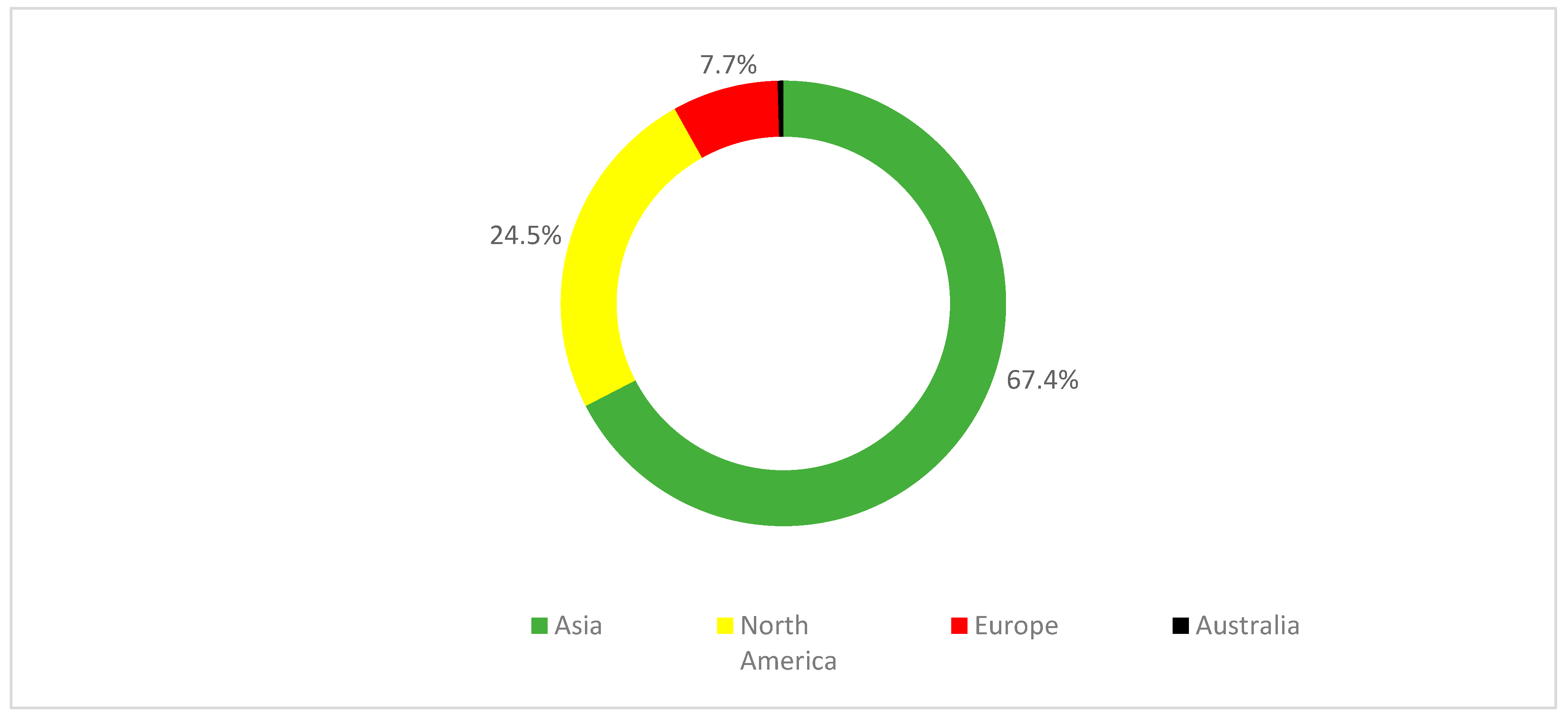
| No. | Ref. | Year | Focus | Summarized Highlights |
|---|---|---|---|---|
| 1 | [25] | 2023 |
|
|
| 2 | [77] | 2023 |
|
|
| 3 | [78] | 2023 |
|
|
| 4 | [79] | 2022 |
|
|
| 5 | [29] | 2022 |
|
|
| 6 | [40] | 2023 |
|
|
| 7 | [80] | 2022 |
|
|
| 8 | [48] | 2023 |
|
|
| 9 | [81] | 2021 |
|
|
| 10 | [82] | 2022 |
|
|
| 11 | [83] | 2022 |
|
|
| 12 | [84] | 2017 |
|
|
| 13 | [85] | 2018 |
|
|
| 14 | [50] | 2022 |
|
|
Disclaimer/Publisher’s Note: The statements, opinions and data contained in all publications are solely those of the individual author(s) and contributor(s) and not of MDPI and/or the editor(s). MDPI and/or the editor(s) disclaim responsibility for any injury to people or property resulting from any ideas, methods, instructions or products referred to in the content. |
© 2023 by the authors. Licensee MDPI, Basel, Switzerland. This article is an open access article distributed under the terms and conditions of the Creative Commons Attribution (CC BY) license (http://creativecommons.org/licenses/by/4.0/).





